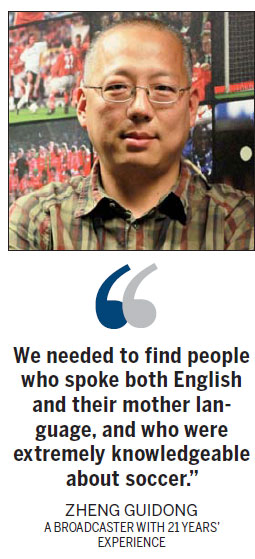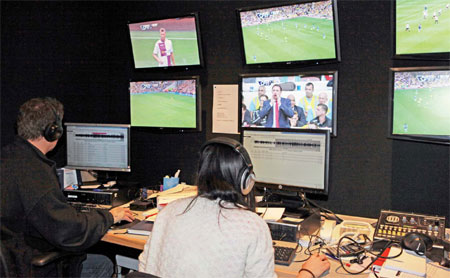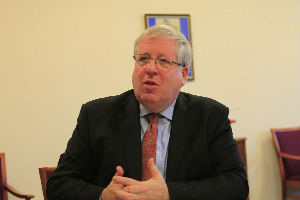Voices on air put ball into the net
Updated: 2013-10-18 08:56
By Qiu Bo (China Daily Europe)
|
|||||||||||
|
More Chinese have been hired by broadcasting companies in the UK to commentate on football games in an effort to reach more Chinese football fans. Qiu Bo / China Daily |
 |
Related video: Talksport aims at China
Mandarin soccer commentaries may be big money spinner for broadcaster
Hou Zhihui talks excitedly as he recalls a football radio commentary he heard more than 30 years ago.
"The voice was full of energy and passion, something you rarely find in TV commentaries now," he says. "You got a clear picture of what was happening on the field, enough to even keep you awake the whole night".
In China and elsewhere the great majority of football fans are happy to watch the sport on television, and the passion for live radio commentaries is something very few nurse these days. But radio refuses to die, and audio aficionados like Hou, 47, a night-shift taxi driver who lives in Mianyang, Sichuan province, can now hear the likes of Arsenal playing Chelsea and Liverpool playing Manchester United via a platform of radio stations in primary provincial cities, thanks to a new deal.
"We think China will be the one of the biggest parts of our international broadcast business," says Scott Taunton, chief executive of what is said to be the world's biggest sports radio station, Talksport. "The reason is it is interesting, and the scale of economy, the size of population and their interest in particular in Premier League football."
Last year the radio station, owned by an ITV Northern Ireland licensee, UTV, obtained the rights to broadcast Premier League games in any language outside the UK and the eurozone. That has now been extended to cover the whole world outside the UK and Ireland.
The station is allowed to fully broadcast 380 league matches each season, and last year broadcast matches in English, Mandarin and Spanish, including through the Internet and mobile apps.
"The British market for us remains the biggest side of Talksport's business, but it is difficult to see where as a business we grow domestically and get more scale than we have now," says Taunton, an Australian.
Competing against the license-fee funded BBC, Talksport realized the interest in its product extended well beyond the UK, so looked further afield for opportunities.
"The scale of population in China means we only need relatively small percentages of people to be listening for it to be something with significant scale," Taunton says.
In the UK, Talksport is said to have 1.9 percent of the listening audience, or 3.2 million listeners a week.
"We do not need to be the largest radio station in China for this to work," Taunton says.
"We just need to have a loyal base of listeners, and it will grow over time."
Last football season, during the deal's first year, Talksport received very positive feedback on its Mandarin commentaries from all over the world, except the Chinese mainland, Taunton says. That is because few there would have heard them, the company being eager to ensure that it acted in accordance with Chinese law.
"As a result, we took steps to prevent our services going to the Chinese mainland."
Now on the mainland, Talksport's Premier League broadcasts are restricted to Changchun, Chengdu, Nanjing, Qingdao and Tianjin. The games are broadcast each weekend by local radio stations, which receive the audio from Britain through the Internet. The station's listeners can also hear the broadcasts through live Internet streaming.
According to the industry website Radio Today, the station partnered with Adrep China Advertising Services Limited, an advertising sales, marketing and business support services company with offices in Beijing and Shanghai, to develop marketing services in the country.
"The expectation is it will grow," Taunton says. "I will be very disappointed if at the end of this season there were no broadcasting in Beijing and Shanghai."
China is just part of Talksport's global strategy, and it says it is willing to incur losses before the enterprise becomes profitable.
"We had been working on the project about 18 months prior to the agreement," Taunton says. "So effectively three years ago we started conceptualizing this business and building the business model."
Talksport estimated recently that it had lost 1.3 million pounds ($2 million; 1.5 million euros) last football season on the worldwide broadcasting project, 500,000 of that in the first six months of the season and the rest in the second half.
Before the project was launched, Taunton had told The Guardian newspaper that in its first year the station would lose one million pounds, break even the second year and be turning a profit in the third.
"We are in profit now, which is really positive," Taunton says. "Better than I expected. And the take-up from the syndication partners has been greater than I thought."
The bulk of profit has come from North America and Africa, he says, adding that with a solid base of listeners, big brands may now be keen to sign on for advertising.
"Lots of different brands, lots of different categories. It might be a bank, a telecom company or a technology provider."
Global sponsorship deals are now being lined up with the likes of Coca-Cola, Pepsi and Nike, the company says.
But just as cash is needed to keep the operation running, one other ingredient is essential: voices to broadcast the 380 Premier League games each season. That meant that in the planning stages Taunton needed a talent scout, and for Chinese the person who seemed an obvious choice was Zheng Guidong, 42, a broadcaster with 21 years' experience. He was working in Britain for another sports media outfit, Perform, when Talksport recruited him in June.
"It was a cross-cultural international project, and that really made me excited," Zheng says.
His main concerns at the beginning were that many of those working for the team would be amateurs, they would be scattered far and wide, and they would need to be trained.
Today's Top News
China, Russia reach big oil deal
Apple unveils new Macs, iPad
Officials promote power relations
Home prices rise further in Sept
Big challenges lie ahead for urban planners
Firms urged to contact unions abroad
Smart cities to aid urbanization
UN films highlight rise in HIV cases among women
Hot Topics
Lunar probe , China growth forecasts, Emission rules get tougher, China seen through 'colored lens', International board,
Editor's Picks

|

|

|

|

|

|






